Molyneux Surname Ancestry ResultsOur indexes 1000-1999 include entries for the spelling 'molyneux'. In the period you have requested, we have the following 478 records (displaying 321 to 330): Single Surname Subscription | | | Buying all 478 results of this search individually would cost £2,402.00. But you can have free access to all 478 records for a year, to view, to save and print, for £100. Save £2,302.00. More... |
These sample scans are from the original record. You will get scans of the full pages or articles where the surname you searched for has been found. Your web browser may prevent the sample windows from opening; in this case please change your browser settings to allow pop-up windows from this site. East Kent Registered Electors: Whitstable
(1865)
The poll for two knights of the shire to represent the Eastern Division of the county of Kent in parliament was taken 18 July 1865, the candidates being Sir Edward Cholmeley Dering, bart., (D), Sir Brook William Bridges, bart., (B), and Sir Norton Joseph Knatchbull, bart., (K). This poll book lists all registered electors, whether they voted or not, by electoral district (Ashford, Canterbury, Dover, Faversham, Hythe, Margate, Ramsgate, Romney, Sandwich, Sheerness, Sittingbourne, Whitstable and Wingham) and then by township or parish within which lay the property whereby the electors had qualified. The lefthand column gives sequential number in the whole volume; then follows the elector's full name, surname first, and his address (often elsewhere); and on the righthand side for whom he voted. When the elector was qualified in duplicate the vote is recorded opposite to the number upon which he claimed to vote at the polling booth, and wherever his name occurs elsewhere a reference is made, immediately after the address, to the number where his vote is recorded, with the initials of the candidates for whom he voted. Duplicate voters who were dead at the time of the election, or did not vote, are printed in italics to signify that they did not vote, or are stated to be dead once only; and wherever the names of such electors occur elsewhere references are made to the numbers where alone they are reckoned in the abstract of the poll as dead or not voting. Whenever a number only, without any other reference, follows the address, it denotes that at the number referred to, the elector is entered as not voting. MOLYNEUX. Cost: £6.00.  | Sample scan, click to enlarge

| Dublin University Electors
(1868)
The roll of all persons entitled to vote at elections for members to serve in Parliament for the University of Dublin lists living graduates of the university, arranged alphabetically by surname and christian name(s), with current residence, dates at which their degrees were conferred - Vern. denoting the Spring, Aest. the Summer, and Hiem. the Winter Commencements - and date of registration. Members of the Senate and electors on the books of Trinity College are distinguished by a dagger. Where an elector's name is given in italics, he was no longer known at the residence given.MOLYNEUX. Cost: £4.00.  | Sample scan, click to enlarge

| Inhabitants of Kempsey in Worcestershire
(1868)
Gentry, farmers and traders listed in J. E. R. Kelly's Post Office Directory of Worcestershire. (The sample scan is of the section for the little parish of Hadzor)MOLYNEUX. Cost: £6.00.  | Sample scan, click to enlarge

| Oxford Voters: St Giles
(1868)
The poll of the freemen and electors of the City of Oxford was taken 17 November 1868, the candidates being the Rt Hon Edward Cardwell (C), William Vernon Harcourt esq., Q.C. (H), and James Parker Deane, Esq., Q.C., D.C.L. (D). This poll book, published by the Oxford Chronicle, lists all the voters alphabetically by parish or township, freemen's names being preceded by an asterisk. Postal addresses are given, including street numbers, and in the case of freemen occupation is usually given. Lodgers are listed separately at the end of each section. The areas covered are: All Saints, St Aldate, Binsey, St Clement, Cowley, St Ebbe, St Giles, Headington, North Hincksey, South Hincksey, Holywell, Iffley, St John, St Martin, St Mary Magdalen, St Mary the Virgin, St Michael, St Peter in the East, St Peter le Bailey, and St Thomas; and there is also a list of Out of Town (non-resident) freemen who voted.MOLYNEUX. Cost: £6.00.  | Sample scan, click to enlarge
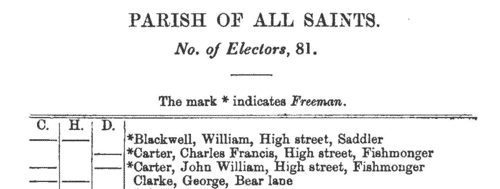
| South Shropshire Poll Book: Worfield
(1868)
The poll book of the election, November 1868, for the Southern Division of Shropshire, is arranged by polling district, and then by parish, township, &c., showing the votes cast (H, Herbert; C, Corbett; M, More), the number on the electoral register, and the full name of the voter, surname first. Where a person had voting qualification in more than one parish, the name is given in each place, but with a cross-reference to the parish list with the entry the vote(s) cast. At the head of each column of register numbers there is a letter in bold indicating the polling district - A, Bishop's Castle; B, Bridgnorth; C, Church Stretton; D, Cleobury Mortimer; E, Clun; F, Ludlow; G, Pontesbury; H, Shiffnal; I, Wenlock.MOLYNEUX. Cost: £6.00.  | Sample scan, click to enlarge
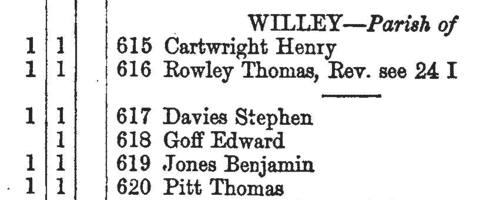
|  Outstanding soldiers of the King's Royal Rifle Corps
(1860-1870) Outstanding soldiers of the King's Royal Rifle Corps
(1860-1870)
Each year outstanding soldiers of the 60th Regiment (The King's Royal Rifle Corps) were chosen for good conduct medals and gratuities: these are listed here. There were two lists, one for men recommended for the Good Conduct Medal without a gratuity, and one for gratuities - £5 to a private, £10 to a corporal, and £15 to a serjeant. Both lists are indexed here, and each gives rank, name, regimental number, date of recommendation and date of issue. (The sample scan is from the 105th foot)
MOLYNEUX. Cost: £8.00.  | Sample scan, click to enlarge
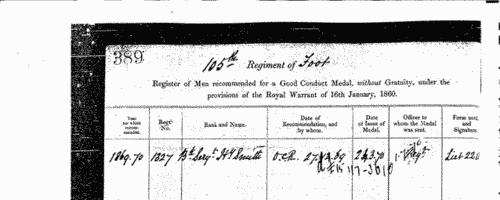
| London Members of the National Provident Institution
(1870)
The membership lists of the National Provident Institution were issued in separate volumes for Town (i. e., London and vicinity) and Country members. This list of Town Members is arranged alphabetically within fifteen districts (1 City; 2 Strand, Bloomsbury; 3 Pentonville, Islington, Highbury, Holloway; 4 Soho, St James's, Marylebone; 5 Camden Town, Kentish Town, Hampstead, Highgate; 6 Regent's Park, St John's Wood, Kilburn; 7 Paddington, Bayswater, Notting Hill, Acton, Ealing; 8 Brompton, Kensington, Hammersmith; 9 Westminster, Pimlico, Chelsea, Fulham; 10 Bishopsgate Without, Shoreditch, Finsbury, City Road, Hoxton; 11 Kingsland, De Beauvoir Town, Mildmay Park, Stoke Newington, Stamford Hill, Tottenham, Edmonton; 12 Whitechapel, Docks, Stepney, Limehouse, Poplar, Plaistow, Barking; 13 Spitalfields, Hackney Road, Bethnal Green, Mile End, Bow, Old Ford, Stratford; 14 Dalston, Hackney, Homerton, Clapton; 15 Southwark). Full name is given, surname first, and full postal address except in those few cases where the member subscribed through an agent. MOLYNEUX. Cost: £4.00.  | Sample scan, click to enlarge
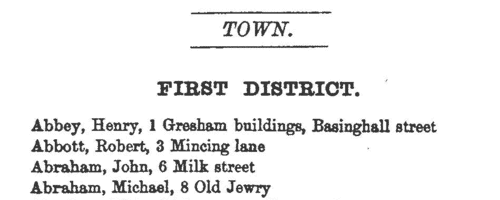
| Boys entering Cheltenham College
(1871)
Cheltenham College 'was founded in order to provide for the sons of gentlemen a Classical, Mathematical, and General Education of the highest order, on moderate terms, in strict conformity with the principles and doctrines of the Church of England.'
Andrew Alexander Hunter, the college registrar, compiled the first edition of the College Register in four parts from 1883 to 1886: these merely listed the boys by term of entry, with their dates of birth and names and addresses of their fathers. Circulars were also sent out to all Old Cheltonians whose addresses were known, requesting additional details. On the basis of the returns from these and Hunter's further researches, this much fuller register was published in 1890.
The information after each boy's name is given (where known and applicable) in this format: father's full name and address as of the time the boy entered the college; class and department on entering the college (classes being number from 1 downwards, and these again divided into A and B, some into C and D, others into P (Principal's side) and V. P. (Vice-Principal's side) - 1A was the highest class in each department: besides this, certain others were called Addiscombe, Woolwich, Civil, Direct, Line, Sandhurst, Naval, Special, Preparatory, Latin, and India Civil) and the same on leaving, name of Boarding House (or 'Day Boy'), scholastic and athletic honours attained at the college, and subsequent career (including date and place of death, or present address in 1890, if known).MOLYNEUX. Cost: £4.00.  | Sample scan, click to enlarge
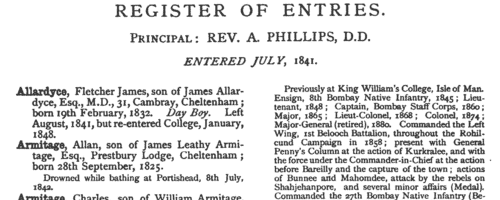
| Boys entering Cheltenham College
(1872)
Cheltenham College 'was founded in order to provide for the sons of gentlemen a Classical, Mathematical, and General Education of the highest order, on moderate terms, in strict conformity with the principles and doctrines of the Church of England.'
Andrew Alexander Hunter, the college registrar, compiled the first edition of the College Register in four parts from 1883 to 1886: these merely listed the boys by term of entry, with their dates of birth and names and addresses of their fathers. Circulars were also sent out to all Old Cheltonians whose addresses were known, requesting additional details. On the basis of the returns from these and Hunter's further researches, this much fuller register was published in 1890.
The information after each boy's name is given (where known and applicable) in this format: father's full name and address as of the time the boy entered the college; class and department on entering the college (classes being number from 1 downwards, and these again divided into A and B, some into C and D, others into P (Principal's side) and V. P. (Vice-Principal's side) - 1A was the highest class in each department: besides this, certain others were called Addiscombe, Woolwich, Civil, Direct, Line, Sandhurst, Naval, Special, Preparatory, Latin, and India Civil) and the same on leaving, name of Boarding House (or 'Day Boy'), scholastic and athletic honours attained at the college, and subsequent career (including date and place of death, or present address in 1890, if known).MOLYNEUX. Cost: £4.00.  | Sample scan, click to enlarge
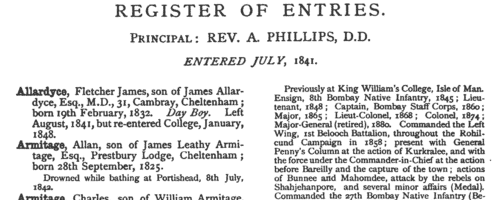
| Baptists
(1873)
The Baptist was a weekly newspaper, with some general news and political coverage, but mainly devoted to chronicling Denominational Intelligence, i. e. the doings of the Baptist churches in Britain and Ireland. January to June 1873.MOLYNEUX. Cost: £6.00.  | Sample scan, click to enlarge
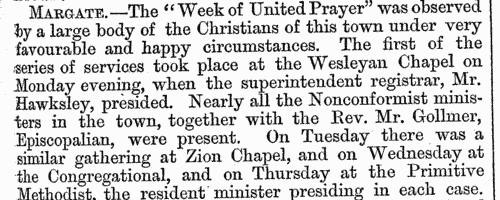
|
Research your ancestry, family history, genealogy and one-name study by direct access to original records and archives indexed by surname.
|













